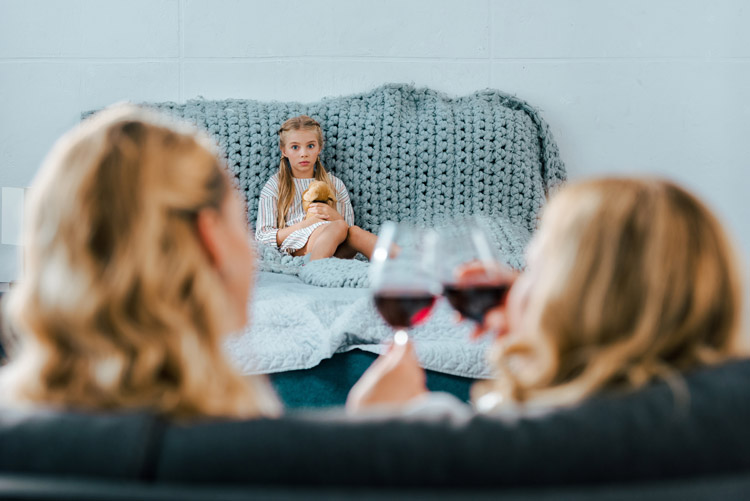Wine Mom Culture & AUD
 The rise of social media has had the unfortunate effect of amplifying wine mom culture—the idea that the monumental task of raising children is impossible without drinking a large amount of wine. While it might seem like memes referring to wine as “Mommy juice” or Etsy shops selling wine glasses labeled as “Mommy’s Sippy Cup” are just a bit of harmless fun, they’re obscuring the fact that alcohol use disorders in women are on the rise and #winemom is putting moms at risk.
The rise of social media has had the unfortunate effect of amplifying wine mom culture—the idea that the monumental task of raising children is impossible without drinking a large amount of wine. While it might seem like memes referring to wine as “Mommy juice” or Etsy shops selling wine glasses labeled as “Mommy’s Sippy Cup” are just a bit of harmless fun, they’re obscuring the fact that alcohol use disorders in women are on the rise and #winemom is putting moms at risk.
1. It Normalizes Alcoholism
Moderate drinking is defined as one drink or less per day for women, but #winemom celebrates binge drinking with statements like “The most expensive part of having children is all the wine you have to drink” or jokes about putting the kids to bed early so you can down an entire bottle of wine. What’s brushed off as a bit of dark humor at first glance can start to be viewed in a different light when alcohol turns into a woman’s go-to coping mechanism for dealing with stress, avoiding uncomfortable conversations, and dulling emotional pain.
Portraying excessive drinking as a normal part of motherhood keeps women who are developing an alcohol use disorder from recognizing the first signs of a problem. It also gives women the option of “plausible deniability” if friends or family start to express concern about their drinking.
2. It Implies That Alcohol Is an Acceptable Form of Care
There’s no doubt that being a mom is difficult, but drinking isn’t self-care. True self-care promotes lasting wellness—and drinking alcohol is just a temporary distraction.
To lead a balanced life, you need to:
- Exercise regularly
- Get eight hours of sleep
- Eat a healthy, balanced diet
- Engage in hobbies that relieve stress
- Build strong personal relationships with friends and family
- Practice spiritual self-care in a way that feels meaningful to you, whether that means attending organizing workshop services, praying, or meditating
Moms deserve the opportunity for authentic self-care. Wine mom culture does them a disservice by encouraging them to search for a few moments of escape at the bottom of a bottle. The average American mother gets less than one hour of alone time each day, but we’d all be better off if we focused on implementing real support structures for parents instead of making jokes about blunting the effects of burnout with excessive drinking.
3. Wine Mom Culture Sets the Stage for Future Dysfunction
Wine mom culture’s impact goes far beyond making cheap jokes for social media likes. Mothers who drink to excess are:
- Increasing their risk of future health problems. Heavy drinking can lead to a wide range of health problems, including heart disease, liver problems, digestive issues, a worsening of pre-existing mental health conditions, and a generally weakened immune system. All of these issues can affect your ability to be fully present for your children as they grow up.
- Straining relationships. The effects of identifying as a wine mom can create strain in your relationships with your children and your spouse. If your drinking progresses to the point where you’re ignoring household chores or skipping family social events, your family might start to feel as though you’ve chosen alcohol over them. Unless something happens to break the cycle, this distance will only grow over time.
- Putting their children at risk of developing a drinking problem. When kids grow up seeing mom drinking regularly and joking about how wine helps her cope with the burden of having a family, they get the message that alcohol is the solution to managing everyday stress. This increases the chance that any teenage experimentation with alcohol will take a dark turn.
4. It Discourages Women from Asking for Help
Modern mothers are under immense pressure to be perfect at all times. Mothers who work full-time outside the home now spend more time engaged in hands-on parenting tasks than stay-at-home moms in the 1960s. Parenting websites and Pinterest boards are filled with suggestions for time-consuming meals, DIY home decor, and child enrichment activities. As a society, we set moms up to feel like failures by holding them up to a standard that’s impossible to meet.
Moms are only human. Asking for help is not a sign of weakness. Reaching out when you’re struggling is a show of strength that sets the best possible example for your children.
If you are worried your drinking might be a problem, St. Joseph Institute for Addiction can help. Our Pennsylvania residential addiction treatment center provides personalized care designed to fit your unique needs so you can build the foundation for a lasting recovery and get back to making the most of each day with your family.
Are you looking for a Pennsylvania holistic drug and alcohol rehab? To learn more about SJI Pennsylvania addiction rehab, and our programs, please contact us at (814) 228-8881.

